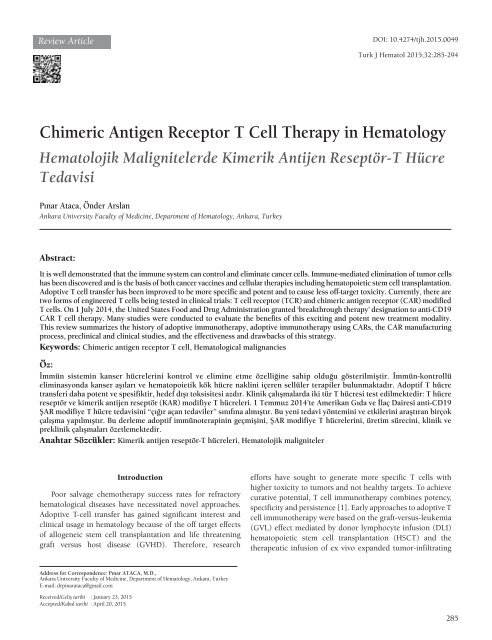Turkish Journal of Hematology Volume: 32 - Issue: 4
You also want an ePaper? Increase the reach of your titles
YUMPU automatically turns print PDFs into web optimized ePapers that Google loves.
Review Article<br />
DOI: 10.4274/tjh.2015.0049<br />
Turk J Hematol 2015;<strong>32</strong>:285-294<br />
Chimeric Antigen Receptor T Cell Therapy in <strong>Hematology</strong><br />
Hematolojik Malignitelerde Kimerik Antijen Reseptör-T Hücre<br />
Tedavisi<br />
Pınar Ataca, Önder Arslan<br />
Ankara University Faculty <strong>of</strong> Medicine, Department <strong>of</strong> <strong>Hematology</strong>, Ankara, Turkey<br />
Abstract:<br />
It is well demonstrated that the immune system can control and eliminate cancer cells. Immune-mediated elimination <strong>of</strong> tumor cells<br />
has been discovered and is the basis <strong>of</strong> both cancer vaccines and cellular therapies including hematopoietic stem cell transplantation.<br />
Adoptive T cell transfer has been improved to be more specific and potent and to cause less <strong>of</strong>f-target toxicity. Currently, there are<br />
two forms <strong>of</strong> engineered T cells being tested in clinical trials: T cell receptor (TCR) and chimeric antigen receptor (CAR) modified<br />
T cells. On 1 July 2014, the United States Food and Drug Administration granted ‘breakthrough therapy’ designation to anti-CD19<br />
CAR T cell therapy. Many studies were conducted to evaluate the benefits <strong>of</strong> this exciting and potent new treatment modality.<br />
This review summarizes the history <strong>of</strong> adoptive immunotherapy, adoptive immunotherapy using CARs, the CAR manufacturing<br />
process, preclinical and clinical studies, and the effectiveness and drawbacks <strong>of</strong> this strategy.<br />
Keywords: Chimeric antigen receptor T cell, Hematological malignancies<br />
Öz:<br />
İmmün sistemin kanser hücrelerini kontrol ve elimine etme özelliğine sahip olduğu gösterilmiştir. İmmün-kontrollü<br />
eliminasyonda kanser aşıları ve hematopoietik kök hücre naklini içeren sellüler terapiler bulunmaktadır. Adoptif T hücre<br />
transferi daha potent ve spesifiktir, hedef dışı toksisitesi azdır. Klinik çalışmalarda iki tür T hücresi test edilmektedir: T hücre<br />
reseptör ve kimerik antijen reseptör (KAR) modifiye T hücreleri. 1 Temmuz 2014’te Amerikan Gıda ve İlaç Dairesi anti-CD19<br />
ŞAR modifiye T hücre tedavisini “çığır açan tedaviler” sınıfına almıştır. Bu yeni tedavi yöntemini ve etkilerini araştıran birçok<br />
çalışma yapılmıştır. Bu derleme adoptif immünoterapinin geçmişini, ŞAR modifiye T hücrelerini, üretim sürecini, klinik ve<br />
preklinik çalışmaları özetlemektedir.<br />
Anahtar Sözcükler: Kimerik antijen reseptör-T hücreleri, Hematolojik maligniteler<br />
Introduction<br />
Poor salvage chemotherapy success rates for refractory<br />
hematological diseases have necessitated novel approaches.<br />
Adoptive T-cell transfer has gained significant interest and<br />
clinical usage in hematology because <strong>of</strong> the <strong>of</strong>f target effects<br />
<strong>of</strong> allogeneic stem cell transplantation and life threatening<br />
graft versus host disease (GVHD). Therefore, research<br />
efforts have sought to generate more specific T cells with<br />
higher toxicity to tumors and not healthy targets. To achieve<br />
curative potential, T cell immunotherapy combines potency,<br />
specificity and persistence [1]. Early approaches to adoptive T<br />
cell immunotherapy were based on the graft-versus-leukemia<br />
(GVL) effect mediated by donor lymphocyte infusion (DLI)<br />
hematopoietic stem cell transplantation (HSCT) and the<br />
therapeutic infusion <strong>of</strong> ex vivo expanded tumor-infiltrating<br />
Address for Correspondence: Pınar ATACA, M.D.,<br />
Ankara University Faculty <strong>of</strong> Medicine, Department <strong>of</strong> <strong>Hematology</strong>, Ankara, Turkey<br />
E-mail: drpinarataca@gmail.com<br />
Received/Geliş tarihi : January 23, 2015<br />
Accepted/Kabul tarihi : April 20, 2015<br />
285

















